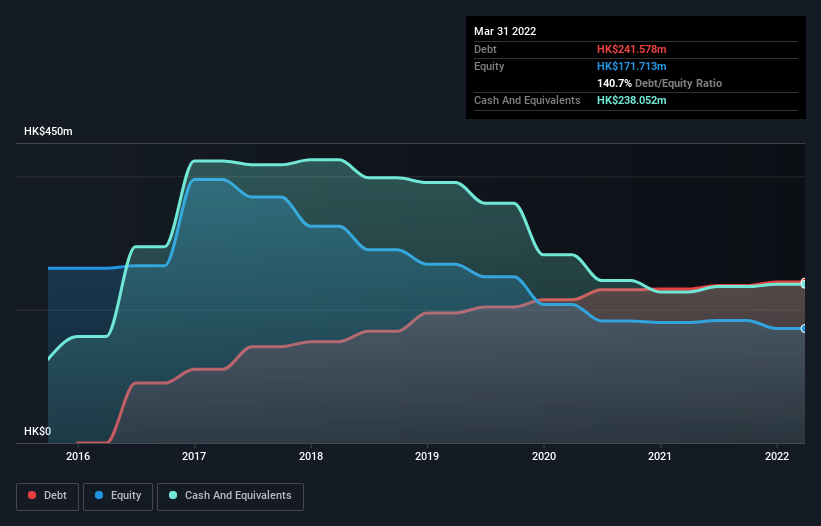David Iben put it well when he said, 'Volatility is not a risk we care about. What we care about is avoiding the permanent loss of capital.' So it might be obvious that you need to consider debt, when you think about how risky any given stock is, because too much debt can sink a company. We can see that Wan Kei Group Holdings Limited (HKG:1718) does use debt in its business. But the more important question is: how much risk is that debt creating?
Why Does Debt Bring Risk?
Debt assists a business until the business has trouble paying it off, either with new capital or with free cash flow. If things get really bad, the lenders can take control of the business. While that is not too common, we often do see indebted companies permanently diluting shareholders because lenders force them to raise capital at a distressed price. Of course, debt can be an important tool in businesses, particularly capital heavy businesses. When we think about a company's use of debt, we first look at cash and debt together.
Check out our latest analysis for Wan Kei Group Holdings
How Much Debt Does Wan Kei Group Holdings Carry?
The image below, which you can click on for greater detail, shows that at March 2022 Wan Kei Group Holdings had debt of HK$241.6m, up from HK$231.0m in one year. On the flip side, it has HK$238.1m in cash leading to net debt of about HK$3.53m.

How Healthy Is Wan Kei Group Holdings' Balance Sheet?
According to the last reported balance sheet, Wan Kei Group Holdings had liabilities of HK$284.6m due within 12 months, and liabilities of HK$1.99m due beyond 12 months. On the other hand, it had cash of HK$238.1m and HK$187.6m worth of receivables due within a year. So it can boast HK$139.0m more liquid assets than total liabilities.
This surplus liquidity suggests that Wan Kei Group Holdings' balance sheet could take a hit just as well as Homer Simpson's head can take a punch. With this in mind one could posit that its balance sheet means the company is able to handle some adversity. When analysing debt levels, the balance sheet is the obvious place to start. But it is Wan Kei Group Holdings's earnings that will influence how the balance sheet holds up in the future. So when considering debt, it's definitely worth looking at the earnings trend. Click here for an interactive snapshot.
Over 12 months, Wan Kei Group Holdings made a loss at the EBIT level, and saw its revenue drop to HK$263m, which is a fall of 10%. We would much prefer see growth.
Caveat Emptor
Not only did Wan Kei Group Holdings's revenue slip over the last twelve months, but it also produced negative earnings before interest and tax (EBIT). To be specific the EBIT loss came in at HK$5.4m. Having said that, the balance sheet has plenty of liquid assets for now. That should give the business time to grow its cashflow. The company is risky because it will grow into the future to get to profitability and free cash flow. When analysing debt levels, the balance sheet is the obvious place to start. But ultimately, every company can contain risks that exist outside of the balance sheet. For example, we've discovered 2 warning signs for Wan Kei Group Holdings that you should be aware of before investing here.
When all is said and done, sometimes its easier to focus on companies that don't even need debt. Readers can access a list of growth stocks with zero net debt 100% free, right now.
Valuation is complex, but we're here to simplify it.
Discover if Wan Kei Group Holdings might be undervalued or overvalued with our detailed analysis, featuring fair value estimates, potential risks, dividends, insider trades, and its financial condition.
Access Free AnalysisHave feedback on this article? Concerned about the content? Get in touch with us directly. Alternatively, email editorial-team (at) simplywallst.com.
This article by Simply Wall St is general in nature. We provide commentary based on historical data and analyst forecasts only using an unbiased methodology and our articles are not intended to be financial advice. It does not constitute a recommendation to buy or sell any stock, and does not take account of your objectives, or your financial situation. We aim to bring you long-term focused analysis driven by fundamental data. Note that our analysis may not factor in the latest price-sensitive company announcements or qualitative material. Simply Wall St has no position in any stocks mentioned.
About SEHK:1718
Wan Kei Group Holdings
An investment holding company, provides foundation construction and ground investigation field works to public and private sectors in Hong Kong and Mainland China.
Adequate balance sheet with slight risk.
Similar Companies
Market Insights
Community Narratives




